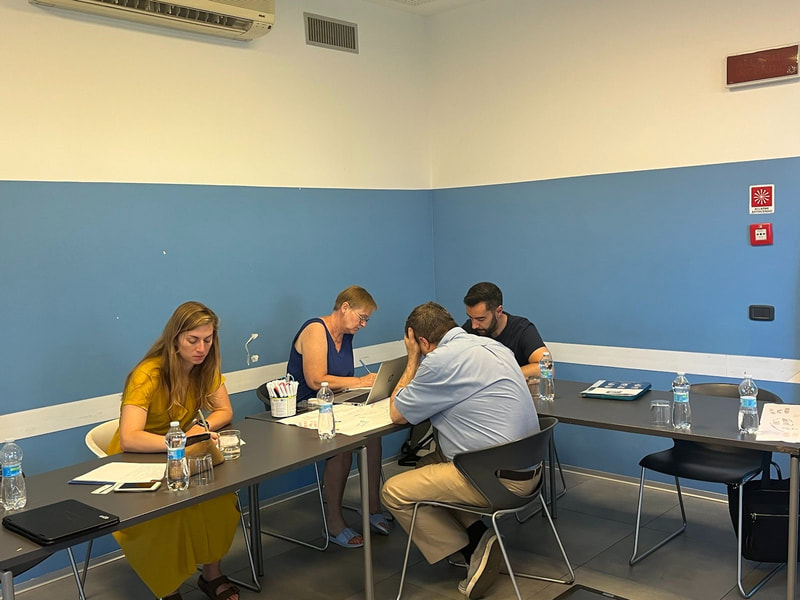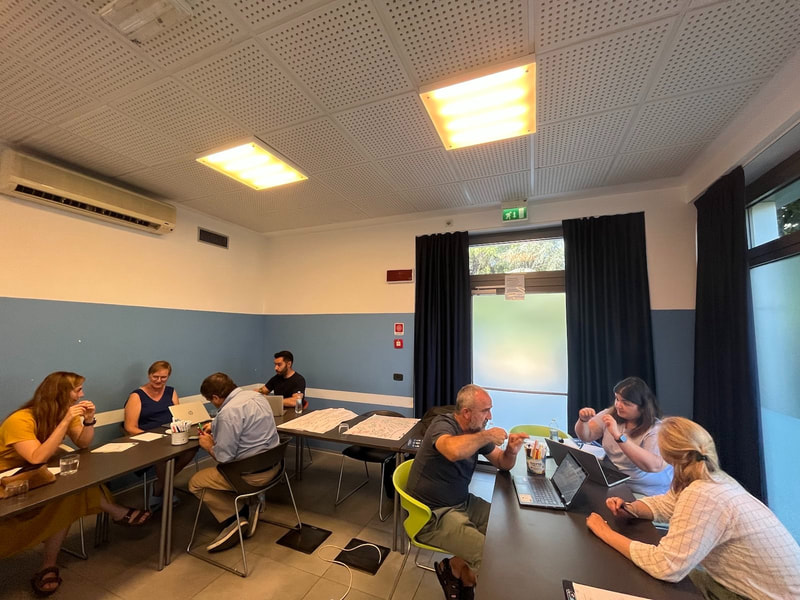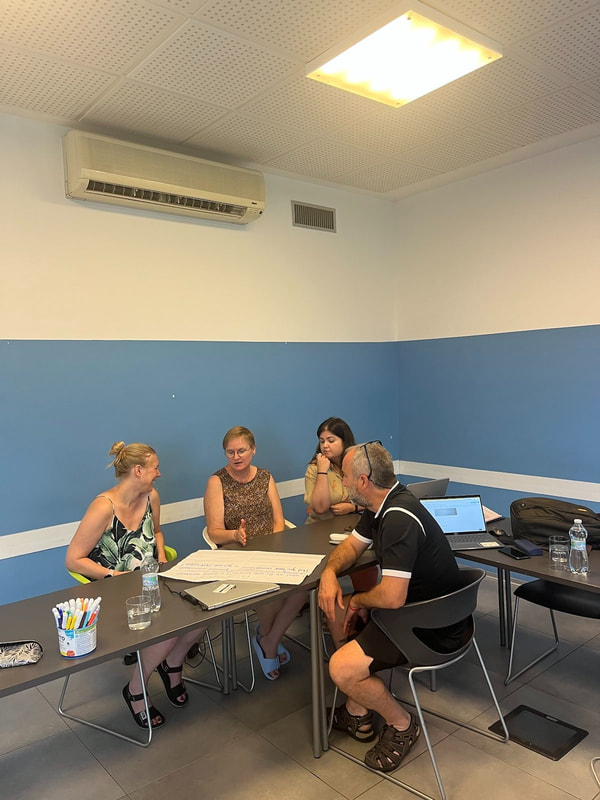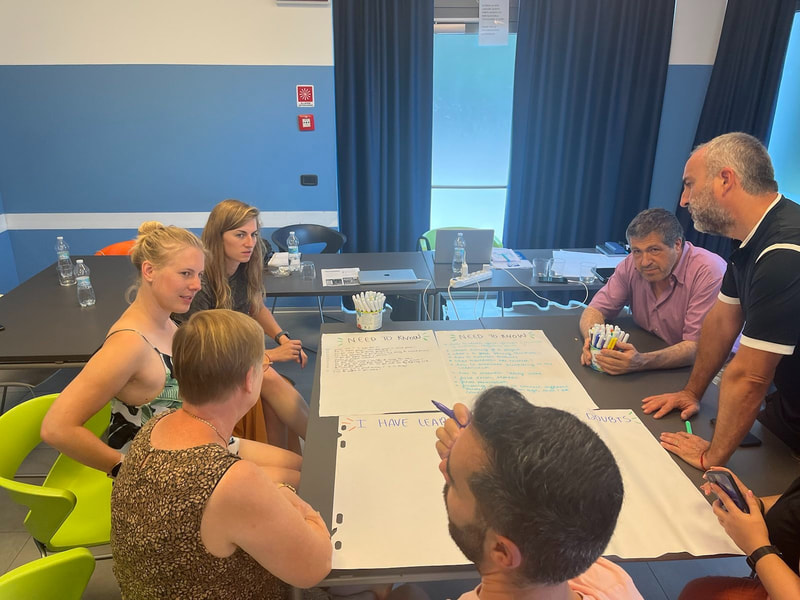|
School programs often incorporate projects in their teaching strategies, however, these endeavors often result in burdensome additional tasks for teachers and impersonal activities that fail to capture students' interest. It is crucial to explore strategies that can introduce PBL in an enjoyable and motivating manner for students while maintaining efficiency for teachers.
The new edition of the course “Introducing Project Based Learning in the Classroom” took place in Bologna from 09/07/2023 to 14/07/2023. The participants arrived from 2 different countries, with Lutgard, Anouk and Silke from Sint-Lodewijkscollege in Belgium, José María from IES JUAN DE JUNI in Spain, Felipe from Colegio La Purísima Valencia in Spain and Ángel and María Ángeles from Colegio FEC Santa Joaquina de Vedruna, Murcia in Spain. As the opening activity of our training course, participants took part in an initial session that served as the introductory activity. During this session, they openly shared and discussed their fears, expectations, and personal contributions. During the initial days of the course, participants delved into the fundamental principles of Project Based Learning (PBL). They specifically concentrated on the five essential elements of PBL, utilizing case study videos to examine how these elements were applied in the showcased project. As they engaged in this process, they swiftly came to the spontaneous realization that PBL is not merely a typical project, but rather a distinct teaching approach with its own set of guidelines and methodologies. Arriving at this point we started to structure of the preparation of a PBL project into certain stages: 1. The class is prepared for project-based learning. Through self-reflection and confrontation, our teachers have realized how significant it is to prepare their students for PBL with the right qualities and the appropriate basic attitude, i.e., above all, the ability to be curious, to reflect, to inquire and, above all, to interact with each other. 2. Working out adequate definitions for Learning Outcomes and “Backward Designing”. An essential element of Project Based Learning is its integration within the curriculum, rather than being perceived as additional work to be done after completing a unit. 3. The formulation of the "Driving Question" and the project specifics are crucial aspects of Project Based Learning. The "Driving Question" serves as the catalyst for students' learning, stimulating their curiosity and engagement. By seeking solutions to the challenge or problem presented in the "Driving Question," students embark on research and inquiry activities. Through this process, they not only address the challenge at hand but also encounter and grasp the essential concepts and knowledge from the relevant disciplines. 4. Developing suitable assessment methods was a significant concern raised by our participants, particularly regarding the evaluation of individual student progress within a group work setting. In this segment of the training course, they had the opportunity to understand the differentiation between formative and summative assessments. They learned that formative assessment holds greater significance and utility in assessing students' progress and performance compared to summative assessment. 5. The integration of ICT tools in Project Based Learning is indispensable. When working on a PBL project, it is difficult to imagine proceeding without the assistance of modern technologies. Our participants had the valuable opportunity to directly experience and utilize some of the essential tools that facilitate the seamless and effective implementation of PBL in the classroom. The participants experienced highly effective learning by engaging in the process of creating their own project throughout the entire week. Each day, they explored different aspects of PBL implementation and, as a group, had the opportunity to design a project tailored to their students' age group. This exercise served multiple purposes. It not only helped clarify any potential doubts that might have arisen during individual project creation but also facilitated idea generation and allowed for fruitful discussions with colleagues from diverse countries. Thanks to the contributions of each participant and their interested and open attitude, we achieved outstanding results as a team in the context of our PBL course. Discover more about this course here. |
Welcome to the ELA Blog. Here you will find articles and photos of our courses and have a look at the topics addressed during the week in Bologna, Palermo and Tenerife. You will also have the chance to take a peek at our projects and check out what we have been up to.
Archives
July 2024
Categories |
-
Course catalogue
- 2023-2024 course catalogue
- Soft Skills >
- ICT and New Technologies >
- Inclusion and Diversity >
-
Innovative Teaching Methods
>
- Innovative teaching methods discovery
- Non-formal education teaching methods
- Dual education and work-based learning
- Teaching leadership and entrepreneurship
- Project based learning
- Game based learning and gamification
- Green skills
- Outdoor education
- Outdoor education trekking edition
- Promoting creativity and critical thinking
- Languages and EU projects >
- Preschool >
- Erasmus Plus KA1
- What we do
- About us
- Locations
- Blog
- Contact us
 English
English български
български Čeština
Čeština Español
Español Français
Français ελληνικά
ελληνικά Italiano
Italiano Polski
Polski Português
Português Română
Română





 RSS Feed
RSS Feed









